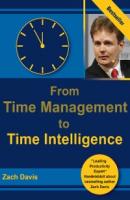From Time Management to Time Intelligence. Zach Davis
Чтение книги онлайн.

Читать онлайн книгу From Time Management to Time Intelligence - Zach Davis страница 7
Название: From Time Management to Time Intelligence
Автор: Zach Davis
Издательство: Автор
Жанр: Экономика
isbn: 9783941546271
isbn:
Of course there is still a need for people in every organization who are primarily responsible for putting out fires. In some areas more than others this lies in the nature of the work. For example, someone working at an IT helpdesk has the job of reacting quickly so the user can continue working. Compared with the helpdesk, a company’s strategy department (due to the nature of the work) usually has fewer issues that come up suddenly.
The IT helpdesk can be seen as representative of many other areas. Remember Savior Sam’s story from earlier in this book? He had only enough time to continue reacting in crisis mode. It is a department manager’s job to ensure that the work force can spend at least 10% of its time on the analysis and prevention of recurring problems rather than on reacting and just “keeping things running.”
Generally, the higher you rise in an organization (and the larger your family or household is), the larger becomes the number of competing responsibilities that you need to reconcile. This makes it even more important to avoid getting bogged down in urgent topics and to focus on working intelligently rather than simply working a lot.
Implementing systems that then run on their own is a good example of such work. By this we mean that, although you initially need to put in effort, you save time once the system is up and running. The model no longer needs to be “time, benefit, time, benefit,” etc. but rather “time, time, benefit, benefit, benefit, benefit,” etc. That is the formula for temporal freedom. As a small digression, the formula for financial freedom is the switch from “time, money, time, money,” etc. to “time, time, money, money, money, money,” and so on. And financial freedom also grants more temporal freedom.
But back to the systems. It is important to know and have access to reliable people who can collaborate with you or relieve you of certain tasks (without wanting to reduce people to a mere function). This goes for work-related as well as private topics. If you cannot pay someone privately then try an exchange – surely you have useful skills that could help the other person. In this way you complete more while at the same time working on something you enjoy or are skilled at.
Planning is another important aspect of such systems. Normally, planning is not an urgent matter. Rarely will someone come to your door saying, “You really need to plan now.” You could just as well skip this step, but planning gives you the advantage of making up the time you spent on devising the actual plan once it is implemented – and chances are you’ll make it up exponentially. Even taking the fifteen minutes to sit down and plan your week will definitely save you time later on. If you get in the habit of doing this every week, it will, in our opinion, become a system that is useful for you.
Take a mini-inventory of your use of time by following these steps: First, make as detailed a list of your past five workdays as possible. Figure out approximately how much time you spent on each activity, then assign the activities to one of the four rings. After that, calculate the percentage of your time spent in each ring. (If you’ve done your math correctly the sum of these four percentages should be one hundred.)
Now let’s interpret these numbers. The sum of the two inner rings will show fairly clearly how productive you were in the relevant period of time, as these are the “important” areas. Adding the numbers from rings two and three will show how high your level of stress was during this time. The difference between a successful and stressful week on the one hand, and a successful and not-so-stressful week on the other hand lies in the difference between rings three and four.
This also lets us realize something very important. As we discussed above with the terms “important” and “urgent,” there are multiple possible combinations of success (with the many individual interpretations of that word) and stress:
1) successful and stressed (often the topic of Zach Davis’s consulting engagements)
2) successful and not too stressed (an interesting combination)
3) unsuccessful and not stressed (which many people would find boring at some point)
4) unsuccessful and nevertheless horribly stressed (very difficult to endure)
Many people ask how they can find the time for working in ring four (the bull’s-eye) when they’re busy putting out fires all day long. That is certainly a valid question. Where does the time for important but not (yet) urgent tasks and projects come from? The answer in terms of the time dartboard is: from rings one and two.
In this book you will receive tips on how to save time in many different ways. We would like to encourage you already to invest in ring four any of the time you save through the techniques you will encounter in further chapters. The larger the percentage of time you spend in ring four, the faster you will be able to develop an upward spiral of effectiveness.
Before getting to the individual tips, let’s discuss a few more basic ideas.
Конец ознакомительного фрагмента.
Текст предоставлен ООО «ЛитРес».
Прочитайте эту книгу целиком, купив полную легальную версию на ЛитРес.
Безопасно оплатить книгу можно банковской картой Visa, MasterCard, Maestro, со счета мобильного телефона, с платежного терминала, в салоне МТС или Связной, через PayPal, WebMoney, Яндекс.Деньги, QIWI Кошелек, бонусными картами или другим удобным Вам способом.